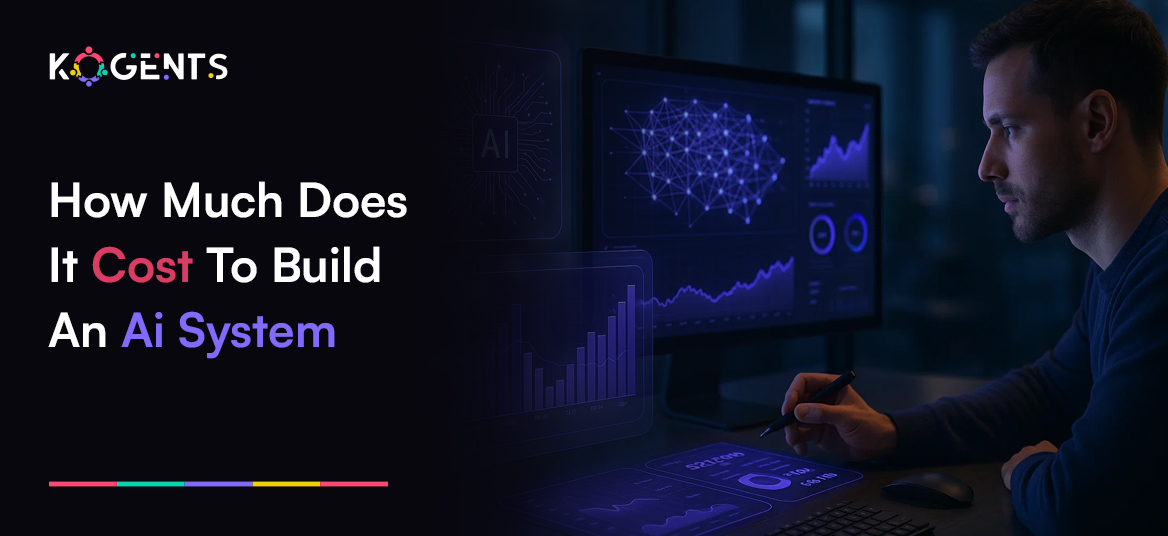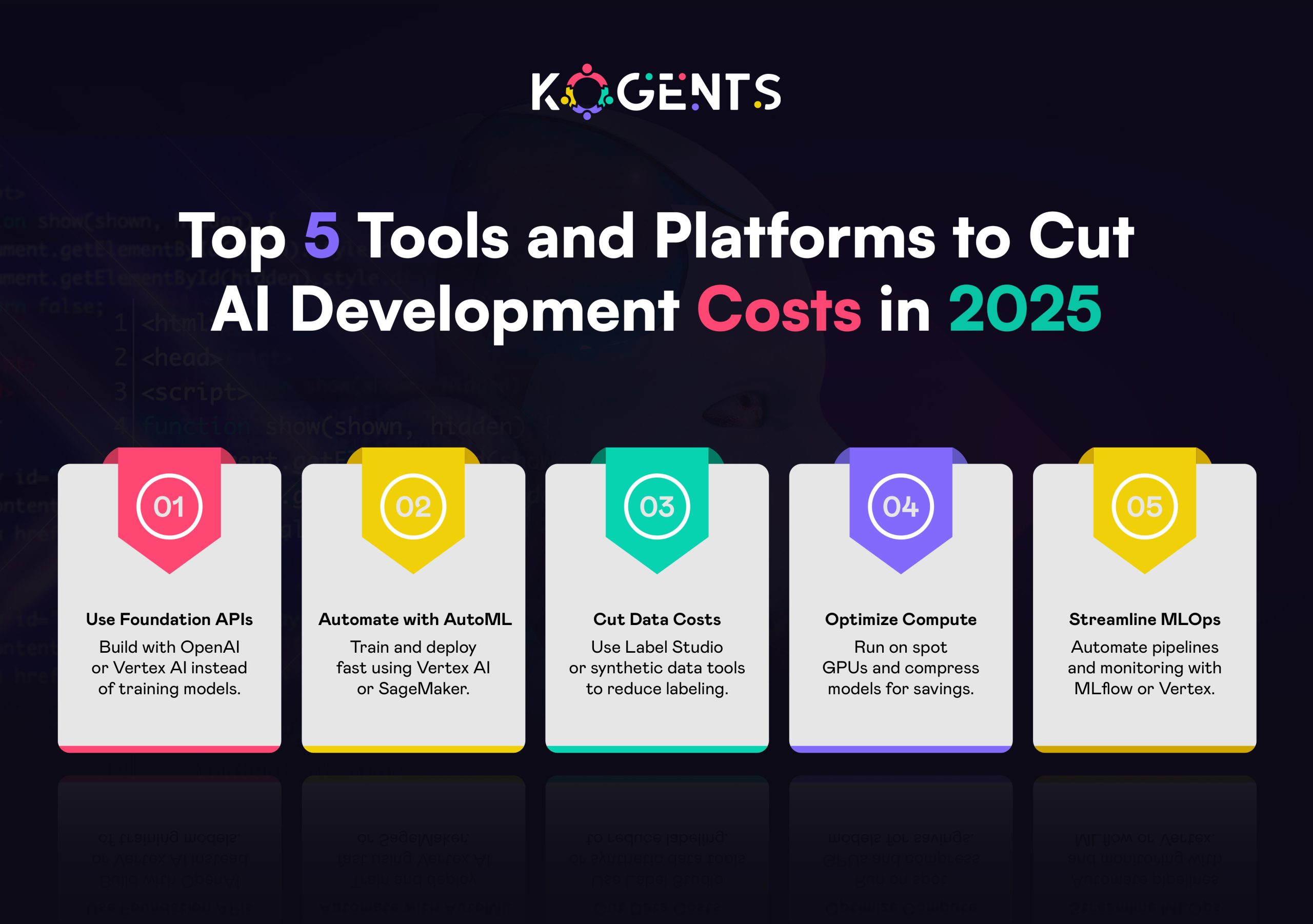How much does it cost to build an AI system?

Summary:
How much does it cost to build an AI system? It’s one of the most common and critical questions today’s entrepreneurs and solopreneurs are asking. The short answer: it depends.
The cost to build an AI system in 2025 can range anywhere from $10,000 for a simple chatbot to over $1 million for enterprise-grade solutions involving natural language processing, computer vision, or predictive modeling.
Yet behind that broad range lies a clear structure of cost drivers, development phases, and ROI opportunities.
The secret isn’t just knowing what you’ll pay, but understanding what you’re paying for: data collection, model training, infrastructure, integration, and ongoing optimization.
In this guide, you’ll find a detailed AI development cost breakdown, from startup prototypes to scalable AI solutions, along with practical budgeting strategies, cost-saving tips, and real-world case studies.
Whether you’re planning a solo AI project or a full-scale SaaS integration, this is your 2025 pricing guide for AI software development.
Key Takeaways
- AI system development costs range from $10K to over $1M.
- Data preparation and model training drive the biggest expenses.
- Start with a Minimum Viable AI to minimize risk.
- Use cloud-based AI and pre-trained models for affordability.
- ROI is often achieved within 6–12 months.
How Much Does It Actually Cost to Build an AI System in 2025?
The average cost of building an AI system in 2025 depends on project type, complexity, and required intelligence level:
| System Type | Estimated Cost Range (USD) | Development Time |
| Basic AI Chatbot | $10,000 – $40,000 | 1–2 months |
| NLP-based Virtual Assistant | $30,000 – $80,000 | 2–4 months |
| Predictive Analytics System | $50,000 – $120,000 | 3–6 months |
| Computer Vision System | $60,000 – $150,000 | 4–6 months |
| Enterprise AI Platform | $250,000 – $1M+ | 6–12 months |
AI development costs in 2025 are influenced by:
- Developer hourly rates ($30–$200/hr globally)
- Cloud compute usage and storage.
- Licensing for proprietary APIs
- Data preparation and cleaning costs
Example:
A healthcare startup developing an AI diagnostic model may invest $150K, with $60K on data annotation, $40K on training infrastructure, and $50K on integration and monitoring.
Smaller businesses can begin with AI-as-a-Service (AIaaS) subscriptions from $100–$1,000/month to test feasibility before full-scale development.
Detailed AI Implementation Cost Breakdown
Understanding the AI implementation cost breakdown helps entrepreneurs plan efficiently:
| Cost Component | Description | Average Cost Range (USD) |
| Data Acquisition & Labeling | Gathering and cleaning training data | $5,000 – $50,000 |
| Model Development | Algorithm selection, coding, experimentation | $10,000 – $100,000 |
| Cloud Infrastructure | GPU servers, storage, deployment | $5,000 – $30,000 |
| Integration & Testing | APIs, front-end UI, QA | $5,000 – $30,000 |
| Maintenance & Optimization | Monitoring, updates, retraining | 15–20% of the total yearly |
| Consulting / Project Management | AI strategy and oversight | $5,000 – $25,000 |
Pro Insight: Using pre-trained models (like GPT, BERT, or YOLO) can cut training costs by up to 50%, while data augmentation tools reduce labeling expenses dramatically.
AI System Cost by Type & Use Case
Let’s explore the cost to build AI systems across common applications:
| AI System Type | Purpose | Average Cost (USD) |
| Chatbots & Virtual Assistants | Automate communication | $10K–$40K |
| Recommendation Engines | Personalize shopping or content | $30K–$100K |
| Predictive Analytics Systems | Forecast trends & demand | $50K–$120K |
| Computer Vision Models | Image/video recognition | $60K–$150K |
| Voice & Speech AI | Voice recognition & sentiment | $50K–$100K |
| Healthcare Diagnostic AI | Medical image interpretation | $100K–$500K |
Long-tail example: “How much does it cost to build an AI chatbot?” — around $15K–$35K, depending on NLP depth and multi-language support.
Note: For enterprise solutions, where various best agentic AI company agents collaborate across marketing, HR, and logistics, the AI system price comparison shows a potential total investment of $500K–$1.2M.
Feature-rich systems demand higher investment, but deliver exponential scalability.
Cost Factors that Influence AI Development
What determines the cost of AI systems? Here are the biggest cost factors:
- Data Volume & Quality: Clean, labeled data equals higher accuracy but higher cost.
- Complexity of Algorithms: Deep learning models require more computing power and time.
- Customization vs. Prebuilt Models: Custom AI equals a higher upfront cost, better control.
- Team Composition: Developers, ML engineers, data scientists, and UI experts add to the total cost.
- Deployment Infrastructure: On-premise costs more than cloud-based AI.
- Integration Needs: More APIs result in more engineering hours.
- Ongoing Maintenance: AI models degrade over time; retraining is vital.
Example: A simple chatbot costs ~$15K, but adding multilingual NLU or voice recognition can push costs to $60K+.

Use Cases for Entrepreneurs, Solopreneurs & Healthcare
AI systems aren’t just for big tech; they’re now foundational for solo ventures and startups. Let’s look at how specific industries benefit.
For Entrepreneurs
- Predictive Sales AI: Tools that analyze customer data to forecast demand, reducing marketing waste.
- Inventory Optimization: AI-powered tools track and replenish stock automatically.
- Customer Sentiment Analysis: NLP models detect emotions in feedback for product improvement.
For Solopreneurs
- Virtual Assistants: AI agents like ChatGPT API automate content creation, meeting scheduling, and social media engagement.
- Automated Accounting: Machine learning models categorize expenses and generate reports.
- Personalized Marketing: AI models tailor campaigns based on user behavior.
For Healthcare
- Diagnostic Imaging AI: Systems analyze X-rays and MRIs faster and more accurately than manual methods.
- Patient Data Prediction: Predictive analytics forecast disease risk and suggest early intervention.
- Administrative Automation: AI streamlines documentation and billing, reducing overhead.
According to PwC’s Global AI Study, the AI project cost for startups in healthcare can start from $50,000 but yield an average ROI of 4.5x in operational efficiency.
Mini Case Example: A telemedicine startup implemented an AI symptom checker for $80K. Within six months, it reduced consultation wait times by 40% and boosted patient retention by 25%.
How to Estimate and Budget for Building AI Software?
To create a realistic AI development budget, follow this framework:
- Define MVP Scope: Start with one use case.
- Estimate Resource Hours: Multiply by regional developer rates.
- Add Infrastructure Costs: Estimate 20–30% of development cost.
- Include Maintenance: Plan 15–20% annually.
- Test ROI: Forecast operational savings and revenue boosts.
Formula: AI Budget = (Development Hours × Hourly Rate) + Infrastructure + Data Prep + Maintenance
Reminder: Tools like Google Cloud AI cost calculator and AWS pricing estimators can help refine your numbers.
How to Reduce AI Development Costs Without Compromising Quality?
- Use pre-trained models (BERT, GPT, YOLO).
- Choose cloud-based ML services instead of local infrastructure.
- Outsource specialized tasks (data labeling, model tuning).
- Leverage no-code AI builders for prototyping.
- Continuously monitor and optimize models to avoid expensive retraining.
Benefits of AI Agents in Terms of Cost Building
While the cost to build an AI application can seem steep, the return on investment (ROI) often surpasses expectations. Here’s why AI is a smart financial decision for business owners:
- Automation Savings: AI reduces manual labor costs by automating repetitive tasks.
- Operational Efficiency: Fewer human errors and faster decision-making.
- Scalability: A one-time AI investment can serve thousands of customers simultaneously.
- Lower Long-Term Costs: Cloud-based AI tools minimize infrastructure expenses.
- Increased Revenue: Personalized recommendations and predictive marketing directly impact sales.
Note: For solopreneurs, this means even small AI systems, like chatbots or analytics engines, can deliver substantial time and cost savings compared to hiring full-time employees.
In short, while AI system price comparisons might initially favor off-the-shelf tools, custom-built AI solutions offer far greater control, scalability, and profit potential.
Challenges & Limitations When Building an AI System
Despite the promise, enterprise AI development and other large-scale AI projects come with challenges that impact both cost and implementation time.
- Data Quality: Poor or insufficient data can inflate costs due to extensive cleaning and retraining.
- Talent Shortage: Skilled ML engineers and data scientists command salaries exceeding $150K/year.
- Infrastructure Costs: High-performance GPUs or cloud storage can add thousands monthly.
- Ethical & Compliance Concerns: Healthcare and finance sectors require strict adherence to data privacy laws.
- Model Maintenance: Continuous model retraining is essential to prevent performance drift.
Pro Tip: To reduce AI software development pricing, use open-source pre-trained models (like BERT, GPT, or ResNet) and customize them instead of starting from scratch.
Understanding these limitations helps in realistic AI development cost estimation and resource allocation during project planning.
AI System vs Other Tools and Cost Analysis
| Tool Type | Average Cost Range | Complexity | Customization Level | Maintenance Cost | Best For |
| Custom AI System | $50,000 – $1,000,000+ | High | Fully Custom | 15–20% yearly | Scaling startups, data-rich businesses |
| No-Code AI Platforms (e.g., Google AutoML, Azure AI Studio) | $10,000 – $50,000 | Medium | Limited | 10% yearly | Small businesses, solopreneurs |
| Traditional Automation Tools (Zapier, Make) | $500 – $5,000 | Low | Minimal | Minimal | Workflow automation |
| Outsourced AI Services | $30 – $200/hour | Variable | Moderate | Depends on the provider | Specialized tasks |
| Off-the-Shelf SaaS AI (e.g., ChatGPT API, Jasper AI) | Subscription ($20–$200/month) | Low | None | Included | Content, support automation |
Key Insight: While traditional automation offers quick wins, custom AI systems deliver long-term competitive advantage and scalability, especially for businesses looking to build proprietary data-driven assets.

ROI and Payback Period of AI Systems
Most AI investments achieve ROI in 6–18 months, depending on automation depth.
| Business Type | Investment | Annual Savings | Payback Period |
| Small E-Commerce | $20K | $40K | 6 months |
| Healthcare Startup | $150K | $300K | 8 months |
| Enterprise Supply Chain | $500K | $1.2M | 10 months |
ROI Tip: Always calculate Total Cost of Ownership (TCO), including compute, retraining, and cloud hosting.
Case Study Spotlight: How AI Systems Benefit Businesses
Case Study 1: Small Business – AI Chatbot Integration
A boutique e-commerce brand invested $20,000 in a custom AI chatbot for order tracking and support. Within three months:
- Customer support tickets dropped by 45%.
- Average response time improved by 85%.
- Revenue increased by 12% due to better retention.
ROI: The system paid for itself in under 6 months.
Case Study 2: Healthcare Startup – Predictive Diagnostics
A medical analytics firm developed a machine learning diagnostic model for $150,000 using AWS SageMaker.
Results:
- Early disease detection accuracy improved by 30%.
- Reduced manual analysis hours by 60%.
- Annual savings of $300K in staff time.
Case Study 3: Enterprise – AI-driven Supply Chain
A manufacturing enterprise implemented a neural network-based forecasting system costing $500K.
Outcomes:
- Supply chain delays reduced by 22%.
- Waste decreased by 18%.
- ROI achieved within 10 months.
Key Lessons Learnt: AI implementation cost breakdowns matter less than measurable outcomes.
Conclusion
The journey to building an AI system isn’t about expense; it’s about investment in capability.
Understanding how much it costs to build an AI system helps entrepreneurs plan effectively, avoid overspending, and align tech goals with business outcomes.
With modular AI, pre-trained models, and cloud APIs, even small teams can now access technologies once exclusive to Fortune 500s.
At Kogents.ai, we help entrepreneurs, solopreneurs, and healthcare innovators build cost-effective AI systems, from strategy to deployment. So, call us at +1 (267) 248-9454 or email us at info@kogents.ai.
FAQs
What factors affect the cost of building an AI system?
Several factors influence the AI development cost estimate, including the project’s complexity, the amount and quality of training data, the choice of cloud infrastructure, and the expertise of your development team.
Is it expensive to develop artificial intelligence?
Not necessarily. While enterprise AI systems can exceed $500,000–$1 million, smaller businesses can build effective machine learning projects for $10,000–$50,000 using cloud-based APIs or low-code AI platforms. The average cost of AI systems has dropped 35% in the past three years due to open-source tools and pre-trained models.
What is the AI development cost breakdown by industry?
Industry type heavily influences cost. Healthcare AI systems typically range between $100,000–$500,000 due to compliance and data sensitivity, while e-commerce or marketing AI tools may cost $20,000–$80,000. Finance and logistics AI solutions often sit between $50,000–$250,000, depending on automation depth and security features.
What is the average cost of AI implementation for small businesses?
Small businesses generally spend $15,000–$80,000 for AI integration. The cost to build an AI application varies depending on whether it’s fully custom-built or uses plug-and-play SaaS AI solutions.
How much does it cost to hire AI developers per hour?
The AI solution development cost per hour depends on geography and skill set. In 2025, North American AI engineers charge $120–$200/hour, while developers in Eastern Europe or India may charge from $30–$80/hour. For a medium-sized AI system development project, labor costs make up 60–70% of total expenses.
Where can I get an AI system cost quotation online?
You can get instant AI development cost estimates using Google Cloud AI, AWS SageMaker, or Azure pricing calculators. Many AI software pricing tools provide quote comparisons for different compute instances, model types, and API usage levels—helping you forecast accurate AI system price comparisons before starting.
Which is better for my business, custom AI or ready-made SaaS AI tools?
If you need scalability and control, custom AI systems are ideal despite higher upfront costs. They typically deliver a higher ROI and long-term affordability. On the other hand, SaaS AI tools like ChatGPT API, Jasper AI, or Zoho AI cost as little as $20–$200/month, perfect for solopreneurs seeking quick deployment with minimal setup.
Is AI development worth the investment for startups in 2025?
Yes. Startups using AI report an average ROI between 200–400% within 12–18 months. The AI project cost for startups is lower than ever, thanks to API-first ecosystems, low-code AI tools, and open-source frameworks.

Kogents AI builds intelligent agents for healthcare, education, and enterprises, delivering secure, scalable solutions that streamline workflows and boost efficiency.